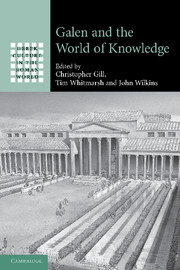Book contents
- Frontmatter
- Contents
- Notes on contributors
- Note on conventions
- Preface
- Introduction
- 1 Galen's library
- 2 Conventions of prefatory self-presentation in Galen's On the Order of My Own Books
- 3 Demiurge and Emperor in Galen's world of knowledge
- 4 Shock and awe: the performance dimension of Galen's anatomy demonstrations
- 5 Galen's un-Hippocratic case-histories
- 6 Staging the past, staging oneself: Galen on Hellenistic exegetical traditions
- 7 Galen and Hippocratic medicine: language and practice
- 8 Galen's Bios and Methodos: from ways of life to path of knowledge
- 9 Does Galen have a medical programme for intellectuals and the faculties of the intellect?
- 10 Galen on the limitations of knowledge
- 11 Galen and Middle Platonism
- 12 ‘Aristotle! What a thing for you to say!’ Galen's engagement with Aristotle and Aristotelians
- 13 Galen and the Stoics, or: the art of not naming
- Bibliography
- Index
2 - Conventions of prefatory self-presentation in Galen's On the Order of My Own Books
Published online by Cambridge University Press: 06 August 2010
- Frontmatter
- Contents
- Notes on contributors
- Note on conventions
- Preface
- Introduction
- 1 Galen's library
- 2 Conventions of prefatory self-presentation in Galen's On the Order of My Own Books
- 3 Demiurge and Emperor in Galen's world of knowledge
- 4 Shock and awe: the performance dimension of Galen's anatomy demonstrations
- 5 Galen's un-Hippocratic case-histories
- 6 Staging the past, staging oneself: Galen on Hellenistic exegetical traditions
- 7 Galen and Hippocratic medicine: language and practice
- 8 Galen's Bios and Methodos: from ways of life to path of knowledge
- 9 Does Galen have a medical programme for intellectuals and the faculties of the intellect?
- 10 Galen on the limitations of knowledge
- 11 Galen and Middle Platonism
- 12 ‘Aristotle! What a thing for you to say!’ Galen's engagement with Aristotle and Aristotelians
- 13 Galen and the Stoics, or: the art of not naming
- Bibliography
- Index
Summary
COMPILATORY WRITING IN THE ROMAN EMPIRE
Galen's relationship with the oratory of the ‘Second Sophistic’ has received a great deal of attention within recent scholarship. His interaction with the medical writing of his predecessors and contemporaries has been widely, albeit far from exhaustively, mapped. And yet, beyond those two areas very little attention has been given to his relationship with the compilatory habits of works that structure so much of the Greek and Latin writing of the Roman Empire. Accumulation of knowledge is a recurring aim for Imperial writers in a wide range of genres. Common techniques and tropes of knowledge-ordering are shared between many different authors and genres that seem at first sight to have little in common: historical and geographical composition, miscellanistic writing, mythography and paradoxography, lexicography, philosophy, scientific writing of many different types, technical and didactic writing, and in addition an enormous range of texts that are barely categorisable within any of those modern groupings, for example Pliny's vast and encyclopedic Natural History, or Athenaeus' ostentatiously eclectic Deipnosophistae. This chapter – focused around a reading of the preface to On the Order of My Own Books (Ord.Lib.Prop.) – offers an initial approach to the problem of how we should situate Galen's work within that vast, if diffuse, Imperial habit of compilation. It aims to draw out Galen's typicality – the way in which he draws on the common language of knowledge-ordering and contributes to it influentially.
- Type
- Chapter
- Information
- Galen and the World of Knowledge , pp. 35 - 58Publisher: Cambridge University PressPrint publication year: 2009
- 4
- Cited by



